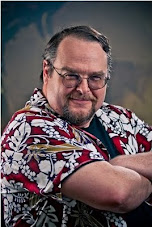The Grapes of Wrath: By John Steinbeck, Adapted by Frank Balati, Directed by Lina Hartzell, Intiman Theatre.
The Lovely Bride wanted to see this one, so we headed out yesterday for the Intiman, located a scant fifty feet from the Rep. The Initiman has more of a theater-in-the-round setting with a projected stage, and has a lot of that intimacy (yeah, I see the pun) between actors and audience.
The play itself I don't have to explain, since you read the book in high school. What, you didn't? Well, at least you saw the movie with Henry Fonda. No? Not even on cable? Well, at least you know about the Okies, the Dust Bowl, and Route 66 before it became "The Midlife Crisis Highway". What's that?
Sigh.
OK, here's the short form. Back in the early thirties a good chunk of the Great Plains dried up and blew away. Farm families couldn't raise anything on their dust-choked land and the banks foreclosed. A lot of them, being told about new opportunities in California, headed west on the Mother Road, Rte. 66. A lot of them were from Oklahoma, hence the name Okies.
The Joad family was one of those families. Tom Joad, newly released from prison, finds his family about to pull up stakes and head west. He and a former preacher Jim Casey go with them. The large family sheds both members and beliefs as they head westward, dealing with death, desertion, and diappointment. And when they get to California, they find that there is no work there, either, because everyone has moved west and the landowners can choose the hungriest for the least amount of pay.
The story is about promise, of dreams dashed and reborn, and the unkillable nature of human hope. The entire first act is about the heading west - burying the old and embracing the new, despite numerous warnings that things are not as rosey as promised. The second act is the crushing reality and growth of a new hope, of organization and gathering together. And though that is crippled as well, still there remains hope, where there remains life.
The play is presented by an ensemble, with most of the huge cast taking numerous parts. Erick Kastel creates a flinty, wind-blasted Tom Joad, returning to a world changed beyond his remembrance. Todd Jefferson Moore breaths life into Jim Casy, the former preacher who finds the need to still help others. The rest of the cast is excellent as well, and while some of the lines are familiar (Hank Fonda's "I'll be there" speech in the movie) they given new life in their presentation.
One challenge to the play is that the original Grapes of Wrath was a book, and a fair-sized one at that, and shrinking it down into two hours and change of acting is a task. This adaption was made in 1988 by Frank Galati, and took the 1990 Tony for Best Play. Yep, a lot of parts of truncated (the salting of the pig, the time spent in the Weedpatch camp), but in general Galati has cored down to the nub of Steinbeck's writing And when he used Steinbeck's language (through narrators), you get the feeling of power of the original work.
The other challenge is that the original Grapes of Wrath was also as big as all outdoors. It is a book about the open country, whether it was the blasted lands of Oklahoma or the road west or the migrant orchards of California. Very little of the action takes place in enclosed spaces, and though the staging struggles with conveying that openess with sparse, wide staging, it is still clear that it is something outdoors moved inside, and constrained by limitations of the media. This also goes for the fact that despite the huge cast and number of changing rolls, the book deals with a multitude on the road, of an entire nation pulling up stakes and moving elsewhere.
And hanging over the proceedings are the spectres of Katrina and Rita (and Wilma - we've finally reached the end of the huricaine alphabet - if there is another storm, we go back to the "A's). The play takes on an added importance as the travails of the Joad clan are mirrored in the uprooted peoples of the Gulf Coast, of struggling to stay human as a world turns against them. There is one sequence where a pair of gas station attendants are talking down on the Okies passing through - saying that the travelers are foolish, they're stupid, they're subhuman, they're gorillas. If it were happening today, the gas jockeys would be pundits on the 24-hour talk channels. No, the situation hasn't changed all that much.
We just don't have a Steinbeck to spare at the moment.
More later,
This Cat Likes Catnip
-
So, some cats like catnip and some don't. Some really, really like it and
some can take it or leave it. And then there's some who will abandon all
digni...
2 days ago


